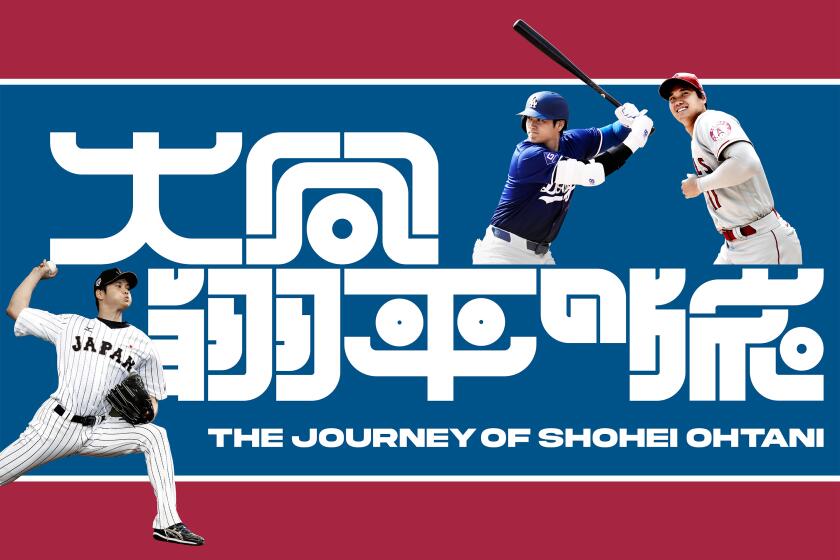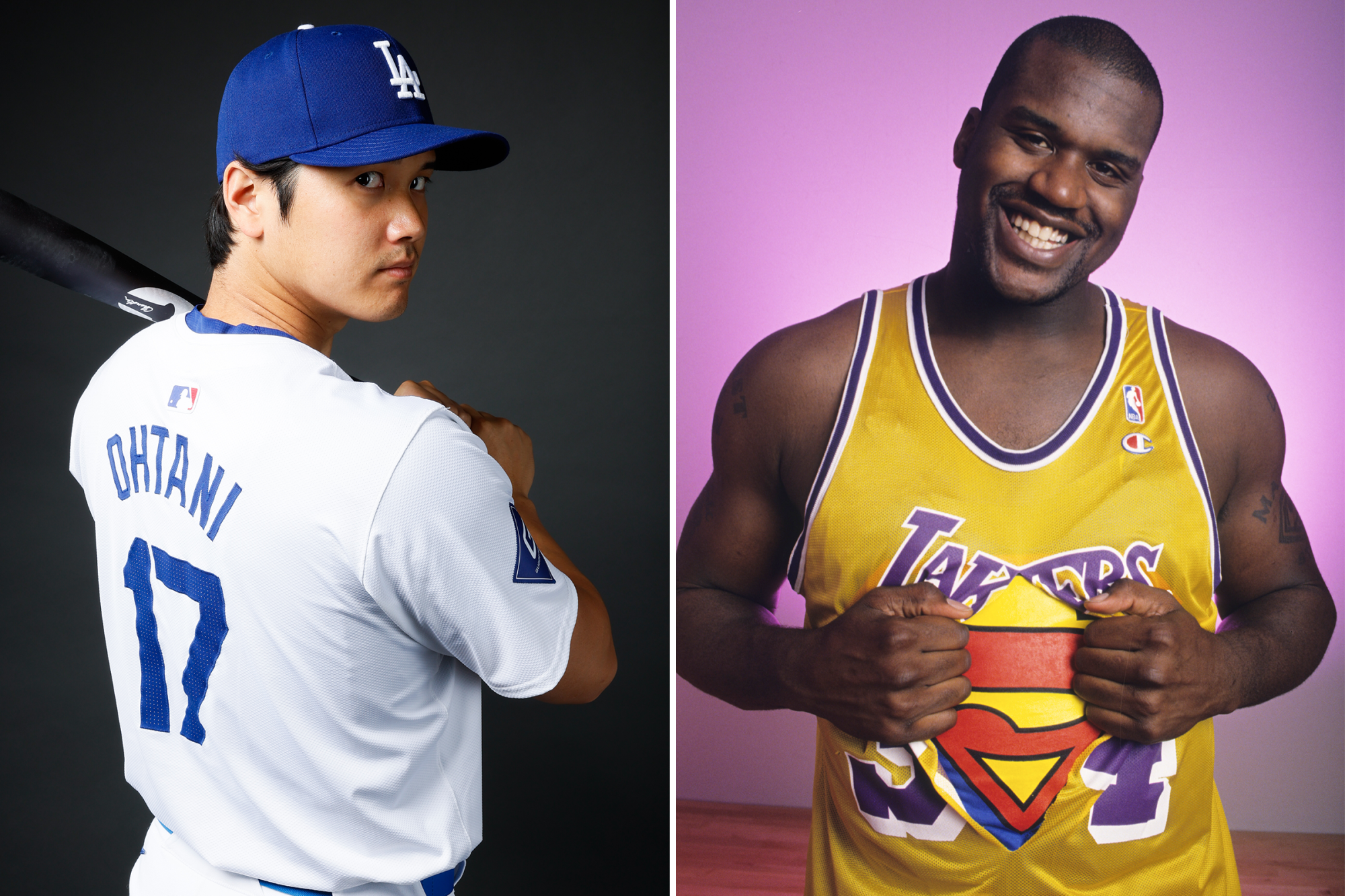
- Share via
A transcendent athlete joins a Los Angeles team at the height of his career.
The city’s sports landscape rumbles with starry-eyed anticipation.
Tickets disappear. Jerseys are everywhere. The entire Southland wants to share in the biggest sporting jewel to choose this city as home.
No, Shaquille O’Neal.
When Ohtani journeyed into Chavez Ravine this winter, despite the apparent electric uniqueness of the moment, he was simply following a path forged 27 years earlier by an even bigger star.
Before Shohei there was Shaq.
Visit Shop L.A. Times today to purchase a copy of our 24-page Shohei Ohtani baseball journey special section.
In the summer of 1996, the Lakers set the standard for bringing Hollywood to Hollywood, signing the free-agent giant from the Orlando Magic and sending the town into a frenzy.
It was so nuts, there reportedly were more reporters at O’Neal’s first workout than fans at Clippers games. It was so hyped, the baselines of an ordinary gym were overcrowded with press at his first exhibition game ... in Hawaii.
Incidentally, remember how Ohtani homered in his first Dodgers spring training game? Well, O’Neal had 25 points and 12 rebounds in 26 minutes in that first exhibition game.
Yeah, Los Angeles has seen this before.
While some of the brightest lights in the history of sports have descended upon this city at the height of their glory — the Kings traded for Wayne Gretzky, the Lakers traded for Kareem Abdul-Jabbar and Wilt Chamberlain and signed LeBron James, the Dodgers traded for Manny Ramirez and signed Darryl Strawberry — no transaction has mirrored the Ohtani deal the way Shaq’s does.
Like the former Angel Ohtani, O’Neal left a team that couldn’t bring him a ring and moved to a place built for championships. Despite teaming him with the young star Penny Hardaway, the Magic didn’t win a title in O’Neal’s four seasons there, and all three of their postseason runs ended in a sweep, including in the 1995 NBA Finals against the Houston Rockets.
Like Ohtani and his $700 million, O’Neal made the move with a record-setting contract, his seven-year, $120-million deal the result of “the highest stakes bidding war in American sports history,” according to The Times’ Mark Heisler.
Although written nearly three decades apart, even the headlines trumpeting the arrivals echoed with the same crazed creativity.
“Sho Business,” read the Times in December 2023.
“Shaq-zamm” and “Lakers hit the Shaqpot” read the Times in July 1996.
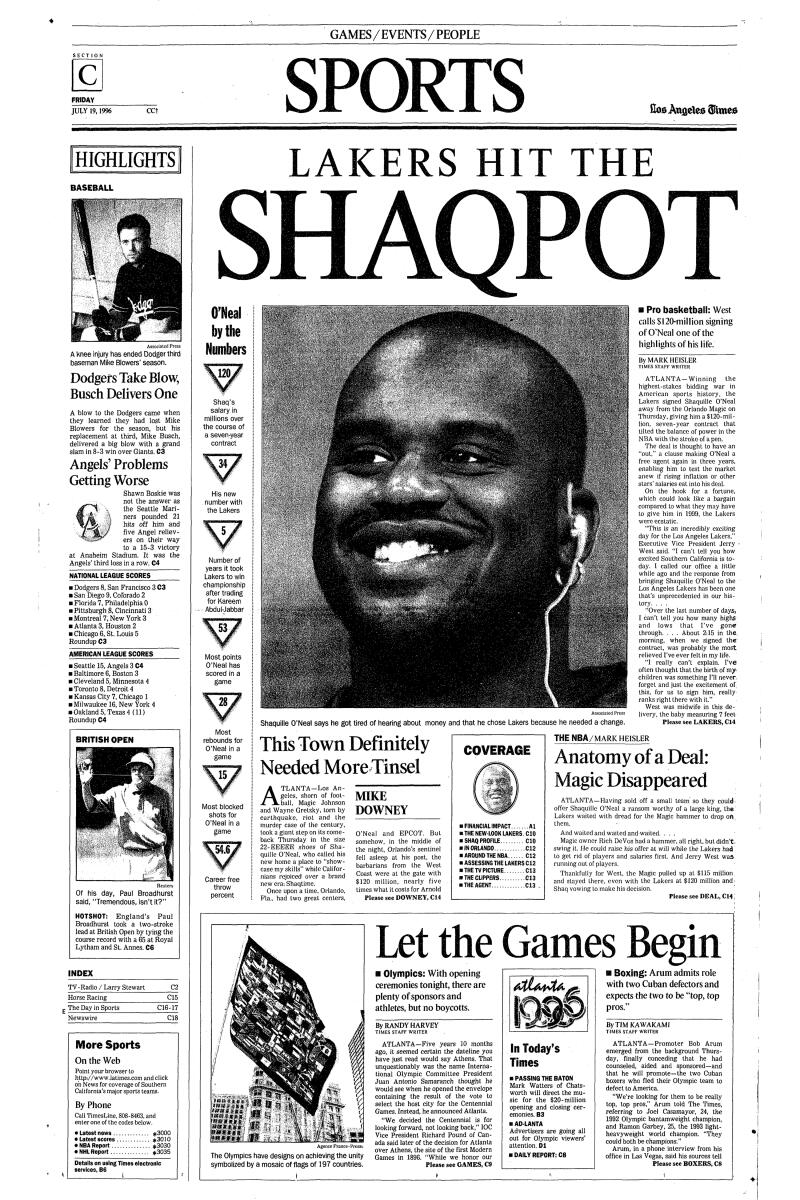
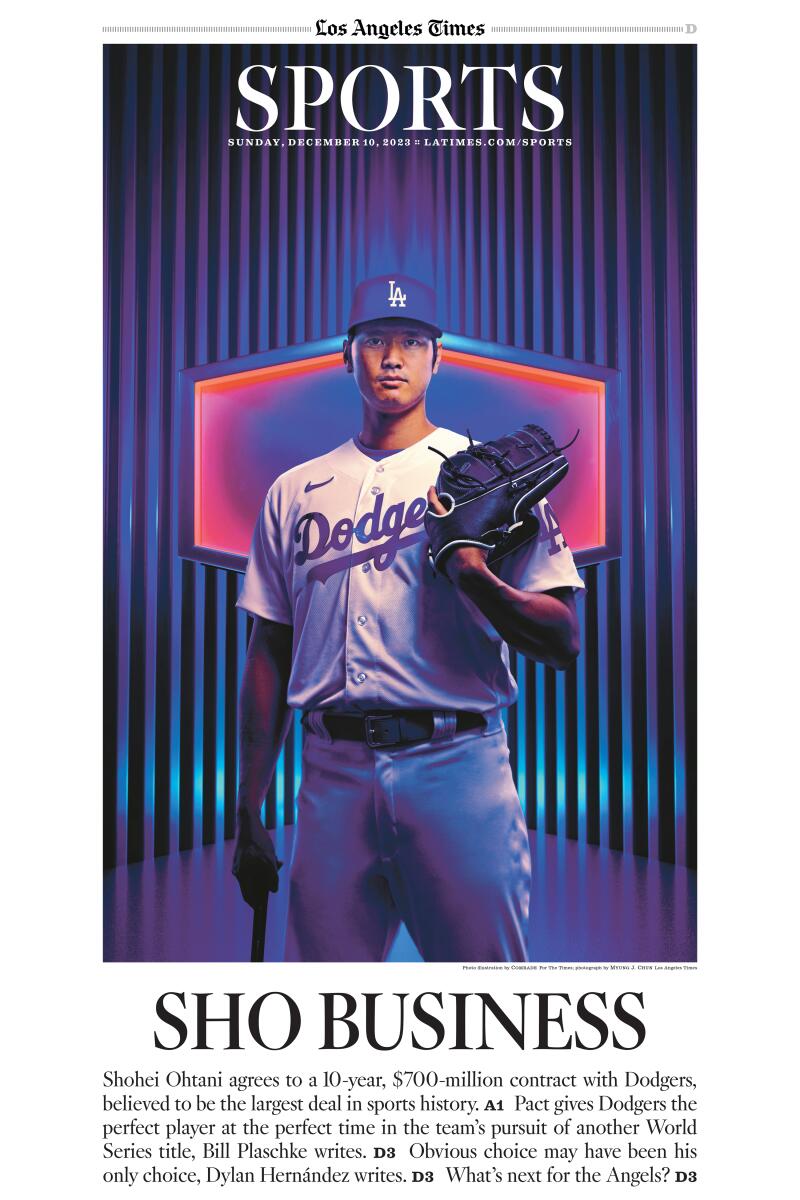
The athletes’ first words also echoed each other.
“I would like to thank the Los Angeles Dodgers organization for giving me an opportunity to play here,” Ohtani said through an interpreter at his opening news conference. “I can’t wait to play for the Dodgers. They share the same passion as me, a vision and a history of winning.”
Ditto for Shaq.
“I’ll be ready,” O’Neal said at his first Lakers workout in the summer of 1996. “I realize this organization has a good tradition of big men. I just want to add on to the great tradition that this organization has. I just want to win.”
Not only did a similar motivation drive the players but the angst felt by their team executives was nearly identical.
Andrew Friedman spoke of the pursuit of Ohtani as an exhausting marathon.
“You know those crazy games where there are late lead changes and they graph it like that [on the Fangraphs website]? I think that’s a little bit my range of emotions,” Friedman told reporters. “There were times I felt more confident. There were times I felt extremely low. It definitely took some time off my life. I don’t know how much time exactly, but it was some.”
Twenty-seven years earlier, Lakers basketball boss Jerry West was describing eerily similar feelings after landing O’Neal.
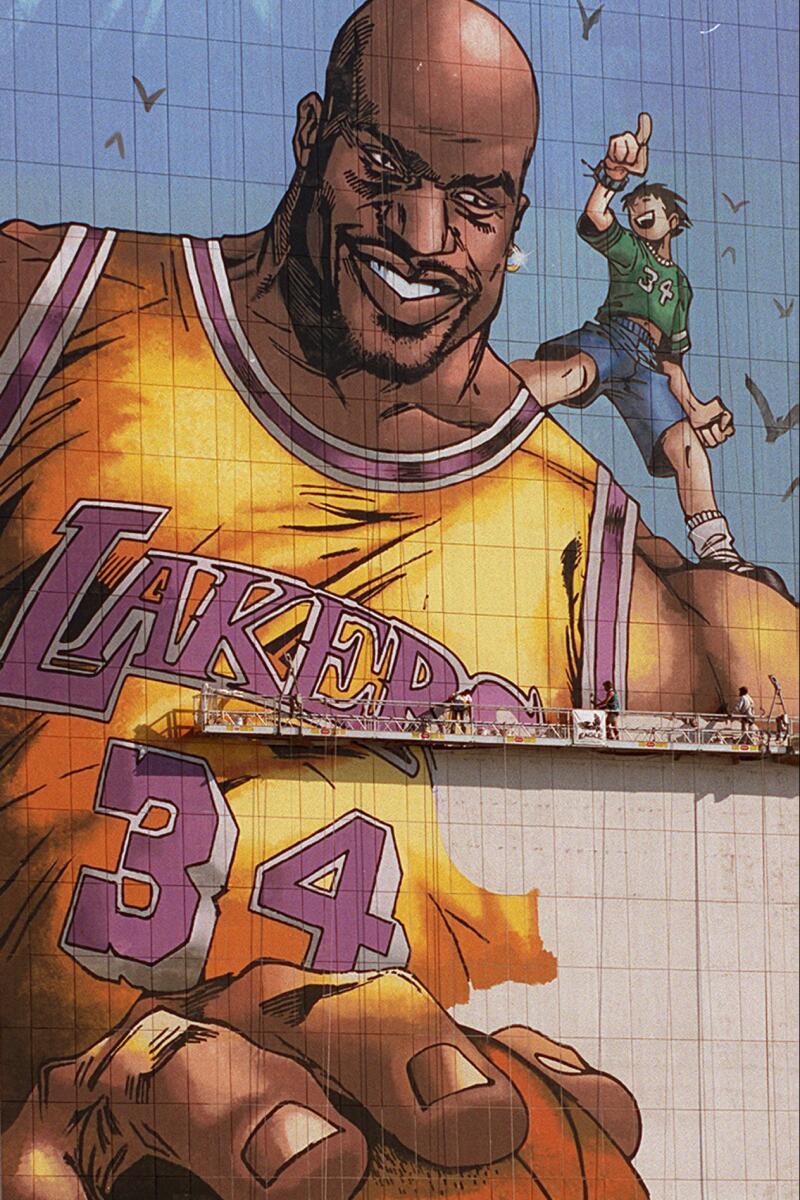
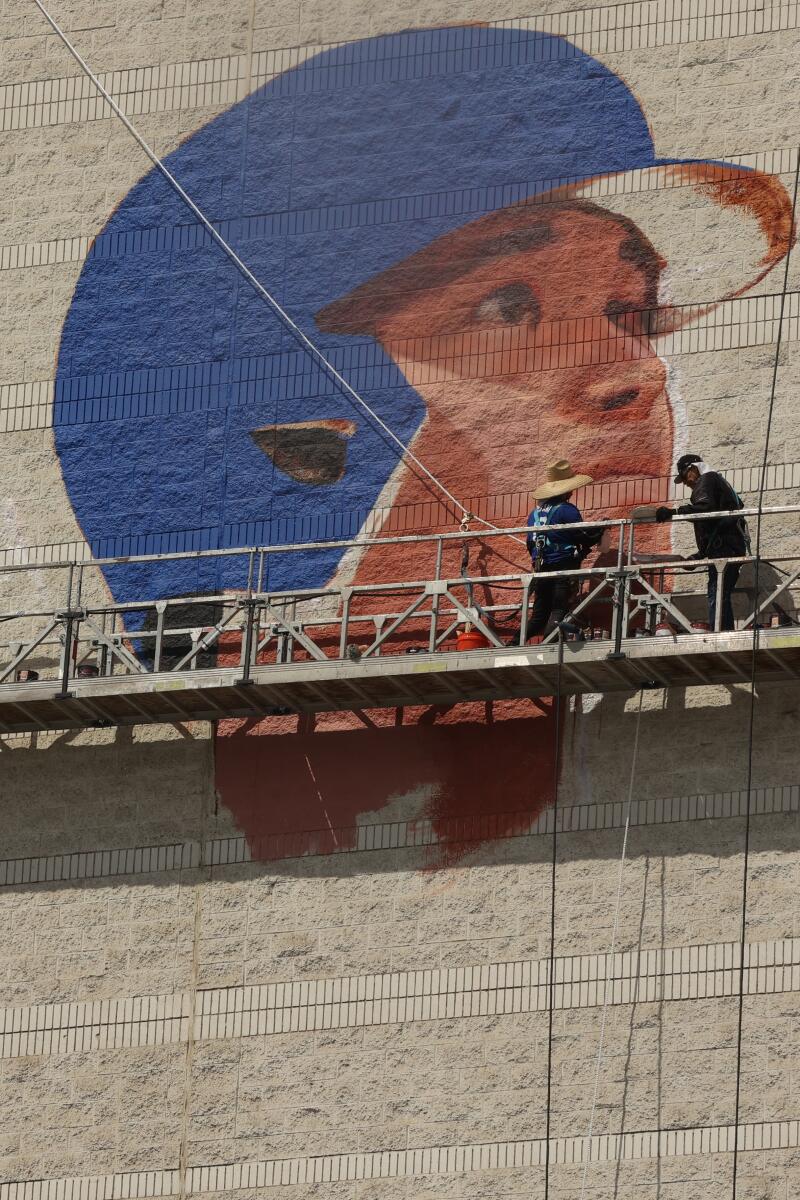
Artists are dwarfed by the image of new Laker Shaquille O’Neal on Nov. 18, 1996, on the side of a downtown Los Angeles building. (Chris Pizzello / Associated Press) A mural is put up of new Dodger Shohei Ohtani on March 12. (Michael Blackshire / Los Angeles Times)
“Over the last number of days, I can’t tell you how many highs and lows that I’ve gone through. ... About 2:15 in the morning, when we signed the contract, was probably the most relieved I’ve ever felt in my life,” West said.
“I really can’t explain. I’ve often thought that the birth of my children was something I’ll never forget and just the excitement of this, for us to sign him, really ranks right there with it.”
The athletes also came to Los Angeles with the same one-of-a-kind reputations.
Ohtani is known to be baseball’s first two-way star since Babe Ruth. The fact that he’s one of sport’s best hitters and pitchers makes him arguably the greatest player ever.
O’Neal had similar unicorn status. Nobody had ever seen a 7-foot-1, 325-pound player who was so quick and athletic. He was difficult to guard and impossible to officiate.
The two stars also came here with big-game reputations, Ohtani having pitched his Japan team to the gold medal in last year’s World Baseball Classic, and O’Neal coming off a gold-medal performance in the 1996 Summer Olympics.
All of these similarities are more than just idle chatter. Within them, one can uncover a blueprint.
How the Lakers treated O’Neal is how every local team should treat its superstar. The Lakers got the very best out of their big man, as he and Kobe Bryant led them to three consecutive NBA championships with O’Neal winning three Finals most valuable player awards. The relationship ended badly, but it was mostly a wonderful marriage that somehow survived a chaotic environment.
The Dodgers can learn from this.
First, let Shohei be Shohei.
If he doesn’t want to regularly engage with reporters, don’t force him. If he wants to move from second to third in the batting order, let him. If he wants to attempt to play the field, allow it. Treat him differently than the other players because, well, he is different.
O’Neal was eccentric. He was entertaining. He couldn’t make free throws and didn’t try. He talked smack about literally everyone who guarded him. Some days he wouldn’t practice. Some nights he would sulk if he didn’t get his touches.
Not once did the Lakers discipline him, preferring to let his personality shine because they knew he would play best when he was happiest.
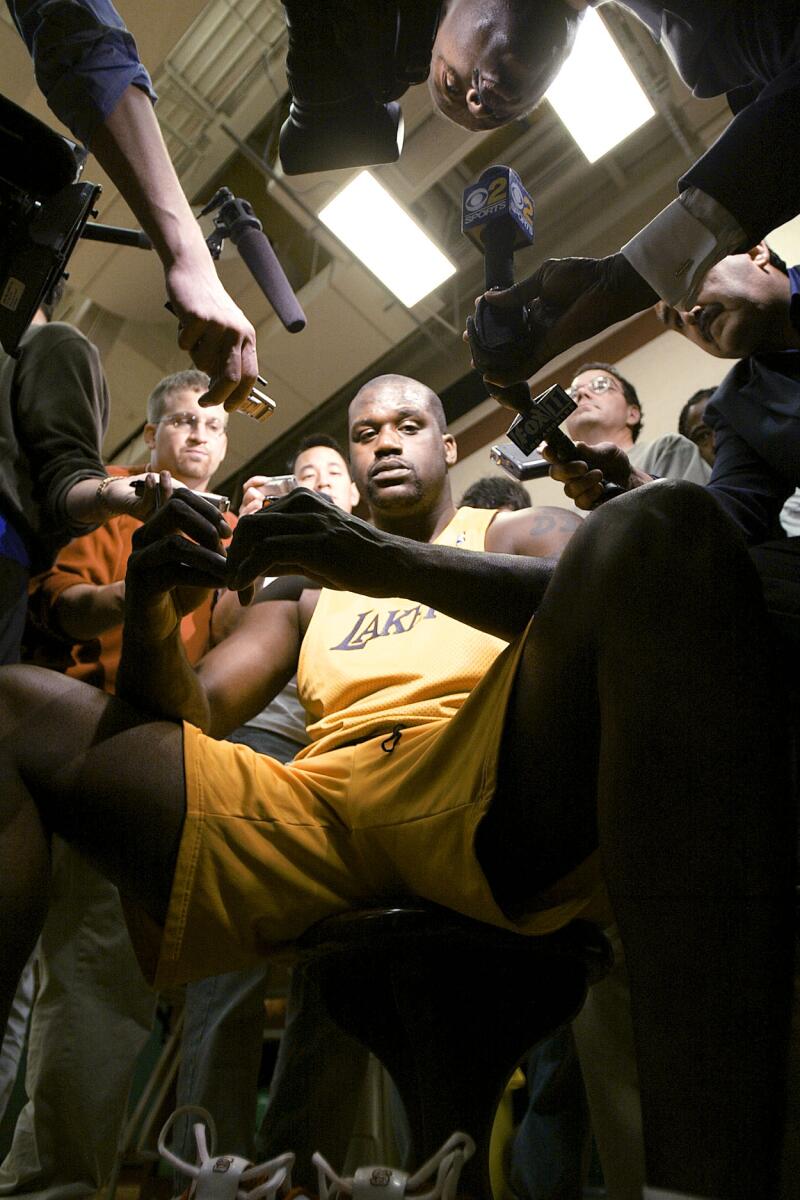
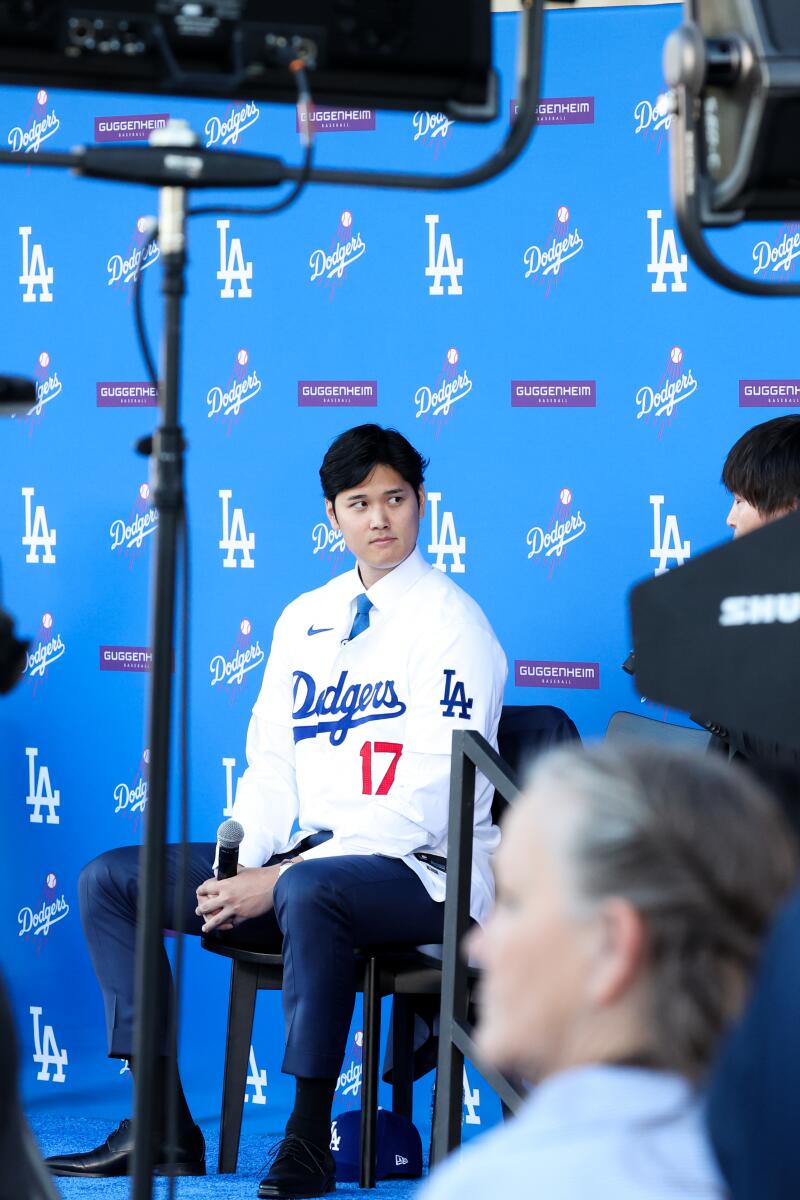
Shaquille O’Neal is surrounded as he answers questions following practice ahead of game 2 of the 2004 NBA Western Conference finals. (Morry Gash / Associated Press) Shohei Ohtani prepares to speak at a press conference at Dodger Stadium on Dec. 14. (Wally Skalij / Los Angeles Times)
One thing O’Neal took seriously was the people around him. He wanted a new coach; the smart Del Harris was dumped for Phil Jackson. He wanted new shooters; longtime Lakers favorites Nick Van Exel and Eddie Jones were sent out, Glen Rice, Rick Fox and Robert Horry were brought in.
Ohtani hasn’t been a Dodger long enough to advocate for changes, and maybe he never will, but if he does, the bosses should listen. Longtime Dodgers fans will cringe at the bequeathing of so much power to one player, but this is how it works in Tinseltown. If you have a star who can handle the overwhelming pressure, you let him handle everything else.
In return, well, the Lakers can direct all doubters to a soaring statue outside Crypto.com Arena that is a tribute to letting stars be stars.
Shaq will be dunking forever.
Shohei, you’ve got next.
More to Read
Are you a true-blue fan?
Get our Dodgers Dugout newsletter for insights, news and much more.
You may occasionally receive promotional content from the Los Angeles Times.


